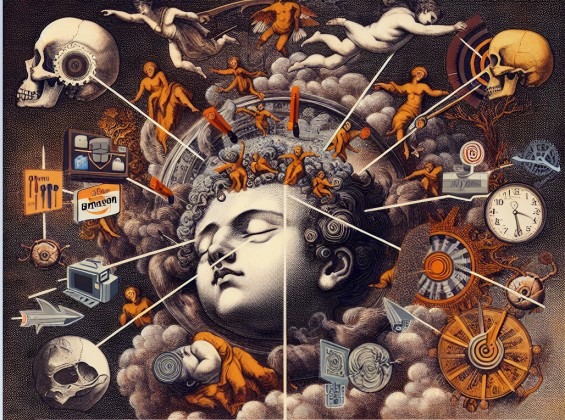
Brainwashing Techniques: The Subtle Art of Influence and Control
Oct 11, 2024
Introduction: Intriguing Insights into Brainwashing Techniques in Media
Welcome to the complex web of societal influences, where manipulation techniques subtly permeate our daily lives, shaping our views and directing our narratives. These subtle manipulations are ubiquitous, from the financial sector’s carefully crafted ideologies and the education system’s suppression of creativity to the political sphere’s clever machinations. The reach and impact of these tactics are far-reaching and undeniable.
As the renowned philosopher Niccolò Machiavelli observed in his seminal work “The Prince,” those in power often employ cunning strategies to maintain their influence and control over the masses. He wrote, “Men are so simple and inclined to obey immediate needs that a deceiver will never lack victims for his deceptions.” This astute observation highlights the vulnerability of individuals to manipulative tactics and the ease with which those in authority can exploit this susceptibility.
The Dutch philosopher Desiderius Erasmus further emphasized the importance of critical thinking and independent thought in his work “In Praise of Folly.” He argued that the opinions of others often sway the masses and fail to question the information presented to them. Erasmus wrote, “In the kingdom of the blind, the one-eyed man is king.” This statement underscores the power of those who control information and the need for individuals to seek out diverse perspectives actively.
These strategies, deploying misinformation, conflicting narratives, and deliberate misdirection, perpetuate a cycle of conformity that stifles the growth of critical thinking. As active participants in this complex network, we must recognize these tactics and question the veracity of the information we encounter. The French philosopher Michel de Montaigne, in his “Essays,” encouraged individuals to engage in self-reflection and question the status quo. He wrote, “The greatest thing in the world is to know how to belong to oneself.” This advice emphasizes the importance of maintaining a strong sense of self and resisting the pressure to conform to manipulated narratives.
Education, an institution that initially sparks curiosity only to suppress it later, adds another layer to this intricate dance of influence. The tension between our innate desire for knowledge and the imposed regimen of standardized tests and rigid structures highlights the need for a radical re-evaluation of our educational systems. As the philosopher John Dewey argued in his work “Democracy and Education,” true learning should be a process of inquiry and exploration, not a mere transmission of predetermined facts.
Decoding the Invisible: Understanding Brainwashing Techniques in Our Daily Lives
The art of planting seeds of doubt has been perfected by the masters of influence throughout history. Mass media provides the perfect environment for these doubts to flourish and become substantial beliefs. Cloaked in the noble intent of spreading information, media outlets subtly aim to shape our thinking. Misdirection is a common tactic, often blowing minor issues out of proportion to divert the public’s attention. The most potent brainwashing institutions today are arguably public schools and mass media.
In finance, a particularly cunning technique stands out—it thrives on the strategic use of brainwashing. Professionals in the industry frequently voice contradictory opinions, creating a two-fold strategy. First, they bombard you with an avalanche of information to overwhelm and blur the specifics in your mind. Then, they present both sides of the argument, ensuring they can conveniently align with the eventual outcome, maintaining their supposed foresight.
Warren Buffet, a renowned investor, once said, “Be fearful when others are greedy and greedy when others are fearful.” This quote rings true in the context of media manipulation. When the masses are often driven towards a particular trend, it’s a sign of a potential bubble, and it may be wise to be sceptical. Robert Kiyosaki, the author of “Rich Dad Poor Dad,” emphasized the importance of financial education. With the financial sector often clouded by manipulative tactics, arming ourselves with knowledge and a critical mindset is our best defence.
Curiosity, the intense desire to explore new, challenging, and uncertain events, is a powerful force that shapes our lives. It’s linked to happiness, creativity, meaningful relationships, personal growth after trauma, and increased life satisfaction. In education, a “hungry mind” is seen as a critical determinant of academic success, rivalling even the predictive power of IQ. However, in the context of our schools, curiosity often seems underappreciated. Amidst the frenzy of standardized testing, schools may overlook what truly matters about learning: the desire to know in the first place.
Albert Einstein, one of the greatest minds in history, once said, “I have no special talent. I am only passionately curious.” This quote underscores the importance of curiosity as a driving force for learning and discovery. Sir Ken Robinson, a renowned education and creativity expert, argued that “curiosity is the engine of achievement.” His work emphasizes fostering curiosity in our classrooms to drive learning and achievement.
An unfortunate reality in our schools today is the gross underestimation of the value of curiosity. In her insightful book, “The Hungry Mind,” Susan Engel discusses the overlooked importance of cultivating the innate desire to learn amidst the tumult of standardized testing obsessions. She notes that these traits are seldom nurtured in the classroom despite our inherent abundance of interest and natural inclination towards exploration.
The current school systems often operate on a more ominous level, subtly employing brainwashing techniques. Under the guise of providing a standardized education, schools may unintentionally suppress students’ curiosity and constrain their thinking within predetermined structures. This practice subtly shapes young minds to conform to societal norms and expectations, overshadowing their natural penchant for questioning and discovery.
Maria Montessori, a pioneer in education, believed, “One test of the correctness of educational procedure is the child’s happiness.” Her philosophy encourages an education system that fosters joy and curiosity in learning rather than rigid conformity. George Orwell, known for his insightful exploration of societal influences, warned, “Every generation imagines itself to be more intelligent than the one that went before it and wiser than the one that comes after it.” This cautionary note serves as a reminder to question the status quo and to continually strive for an educational system that nurtures curiosity and independent thought.
Education Unmasked: Wisdom vs. The Classroom’s Chains
Plato
Knowledge that is acquired under compulsion obtains no hold on the mind.
Chuang Tzu
Reward and punishment is the lowest form of education.
Mark Twain
I have never let my schooling interfere with my education.
Soap and education are not as sudden as a massacre, but they are more deadly in the long run.
In the first place, God made idiots. This was for practice. Then he made school boards.
Oscar Wilde
Education is an admirable thing, but it is well to remember from time to time that nothing that is worth knowing can be taught.
Everyone who is incapable of learning has taken to teaching.
George Bernard Shaw
There is nothing on earth intended for innocent people so horrible as a school.
What we call education and culture is, for the most part, nothing but the substitution of reading for experience, of literature for life, of the obsolete fictitious for the contemporary real.
Bertrand Russell
Men are born ignorant, not stupid; they are made stupid by education.
Education is one of the chief obstacles to intelligence and freedom of thought.
Benjamin Franklin
He was so learned that he could name a horse in nine languages, so ignorant that he bought a cow to ride on.
Thomas Edison
I remember that I was never able to get along at school. I was at the foot of the class.
Henry David Thoreau
What does education often do? It makes a straight-cut ditch of a free, meandering brook.
How could youths better learn to live than by at once trying the experiment of living?
H. L. Mencken
The average schoolmaster is and always must be essentially an ass, for how can one imagine an intelligent man engaging in so puerile an avocation.
Ralph Waldo Emerson
I pay the schoolmaster, but the schoolboys educate my son.
William Hazlitt
Anyone who has passed through the regular gradations of a classical education and is not made a fool by it, may consider himself as having had a very narrow escape.
Laurence J. Peter
Education is a method whereby one acquires a higher grade of prejudices.
Anne Sullivan (I bow to her.)
I am beginning to suspect all elaborate and unique systems of education. They seem to me to be built up on the supposition that every child is a kind of idiot who must be taught to think.
Florence King
Showing up at school already able to read is like showing up at the undertaker’s already embalmed: people start worrying about being put out of their jobs.
Emma Goldman
Since every effort in our educational life seems to be directed toward making the child a being foreign to itself, it must of necessity, produce individuals foreign to one another and in everlasting antagonism with each other.
Edward M. Forster
Spoon feeding, in the long run, teaches us nothing but the shape of the spoon.
Elbert Hubbard
You can lead a boy to college, but you cannot make him think.
Phillip K. Dick
The trouble with being educated is that it takes a long time; it uses up the better part of your life and when you are finished, what you know is that you would have benefited more by going into banking.
William John Bennett
If [our schools] are still bad maybe we should declare educational bankruptcy, give the people their money and let them educate themselves and start their own schools.
John Updike
School is where you go between when your parents can’t take you, and industry can’t take you.
Robert Buzzell
The mark of a true MBA is that he is often wrong but seldom in doubt.
Robert M. Hutchins
The three major administrative problems on a campus are sex for the students, athletics for the alumni, and parking for the faculty.
The college graduate is presented with a sheepskin to cover his intellectual nakedness.
Beyond IQ: A New Understanding of Intelligence
A groundbreaking study challenges the long-standing belief in the effectiveness of IQ tests as the sole measure of intelligence. Published in the journal Neuron, the research identifies three distinct brain circuits contributing to intelligence: short-term memory, reasoning, and verbal skills. The findings debunk the idea that a one-dimensional intelligence assessment can capture individuals’ diverse range of cognitive abilities.
Albert Einstein emphasized the importance of creativity and innovative thinking, aspects not typically measured by IQ tests. Howard Gardner proposed the theory of multiple intelligences, arguing that traditional IQ tests fail to measure the full range of human intelligence. Robert Sternberg’s Triarchic Theory of Intelligence includes analytical, creative, and practical intelligence, highlighting the limitations of IQ tests.
Conclusion: Brainwashing Techniques
Children typically start life with a clean slate, grounded in the proper premises. However, external influences often lead them astray as they grow into adults. Engaging with a child eliminates the need for defences because you can count on them to express unfiltered thoughts, providing a glimpse into straightforward, honest dialogue.
The journey from childhood strength to adult mental challenges is a perplexing transformation. Governments should serve the interests of their people, yet they often prioritize their own needs, giving only passing acknowledgement to the concerns of their citizens. Across nations, governmental agendas seldom align with the genuine desires of the people they are meant to represent.
The tactical deployment of misinformation, conflicting narratives, and misdirection perpetuates a cycle of conformity, hindering the development of critical thinking. As we navigate this complex landscape, it’s crucial to recognize these influences’ orchestrated nature and question the information’s authenticity.
The paradox of education, where curiosity is initially kindled but later suppressed, adds another layer to the intricate dance of influence. The dichotomy between the natural desire to learn and the artificial imposition of standardized testing and rigid structures underscores the need for a fundamental reevaluation of educational paradigms.
As Erasmus wisely advised, “It is the chiefest point of happiness that a man is willing to be what he is.” Let us strive to embrace our individuality and resist the allure of conformity, for therein lies the path to true enlightenment
Unveil the Hidden Gems: Explore More












